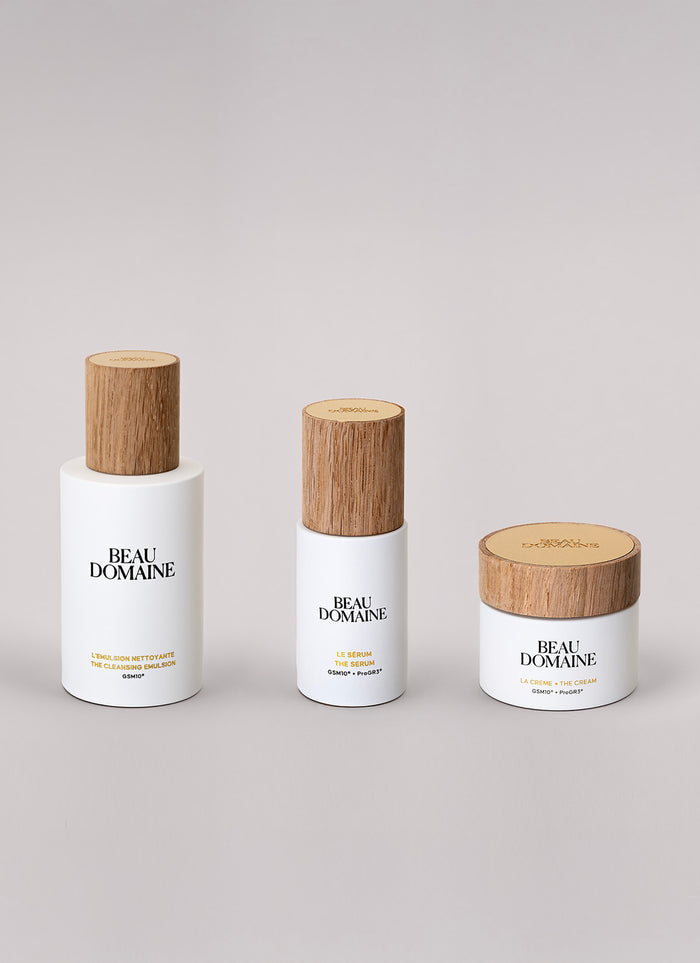BEST SELLER


There's a difference between dry skin (type) and dehydrated skin (condition). Dry skin lacks oil. Dehydrated skin lacks water. So much so that all skin types can be dehydrated. Dehydration can cause discomfort on the face and body, especially after bathing or showering. If you see fine lines at the corners of your eyes or on your cheeks, or small dead skin cells under your makeup, your skin is most likely dehydrated. The first thing to check is if you are drinking enough water. If you are, then here are some common causes for dehydration.
Temperature changes
Changes in temperature and climate cause the skin to adapt. When the skin is overworked, its protective function deteriorates. The skin becomes more permeable, water evaporation accelerates, and the epidermis becomes dehydrated. Specially in winter, try to avoid overheating indoors as well as hot baths or showers. You may also want to opt for a richer moisturizer to help strengthen your skin barrier.
Hard water
It may seem paradoxical, but water does not hydrate the skin. In fact, it can cause dehydration. The lime it contains is deposited on the skin in the form of microcrystals that absorb the skin's natural moisture. That's why it's important to use a toner after rinsing the skin with water, followed by a moisturizer. You should also use lukewarm water to clean your face.
Improper skin care
Using inappropriate cosmetics with a high pH or excessive astringency can harm your skin. These products remove the natural sebum on the surface of the face, which is essential for keeping the inner layers of the skin moisturized. This is often the case with oily skin that uses products that are too "stripping".
The age factor
With its incredible ability to retain water, hyaluronic acid plays a crucial role in skin hydration. However, its production decreases with age. This is why we recommend specific skin care products containing hyaluronic acid. But mature skin is a skin condition in itself. For more info on how to properly take care of dried skin, don't hesitate to take a look at our article.
Skin aging is a natural and inevitable process due to a decrease in skin cell activity. It is influenced by intrinsic (genetic) and extrinsic (environmental and lifestyle) factors such as sun exposure, smoking, stress, diet and hydration.
Collagen, elastin and hyaluronic acid are essential for maintaining skin structure and hydration. As we age, the skin produces less of these, resulting in a loss of firmness and elasticity and the appearance of fine lines and wrinkles.
Combined with reduced sebum production, mature skin tends to be drier and duller. The skin becomes more permeable and sensitive to external aggressions.
Another problem associated with mature skin is hyperpigmentation. Excessive sun exposure is a major cause of age-related hyperpigmentation. Age-related hormonal changes also promote the formation of dark spots.
This skin has become very demanding and requires a skin care routine adapted to its needs. Take a look at our routines to take proper care of mature skins.
Sensitive skin is reactive. It is prone to sensations of tingling, heating, prickling and itching, often accompanied by redness or irritation. These discomforts are often in response to various stimuli:
An inflammatory response triggered by irritants such as certain soaps, household cleaners, or environmental pollutants.
Psychological factors like stress.
Hormonal factors related to the menstrual cycle or menopause.
Physical factors such as sun exposure, temperature changes (heat/cold), wind, air conditioning, heating or hard water.
Dull skin is a term used to describe skin that lacks radiance, luminosity and vitality. It can look tired, blurred, discolored and lifeless. Several factors can contribute to dull skin:
Accumulation of dead cells
Dead skin cells accumulate on the surface, creating a barrier that reflects less light. To remedy this, don't hesitate to exfoliate once or twice a week.
Lack of moisture
Lack of moisture can lead to dehydrated skin that becomes dull and lackluster. For an action on both short and long term, don't hesitate to try The Serum by Beau Domaine. It has an immediate boost effect while acting on the deeper levels of your skin for lasting improved radiance.
Excess sebum
Excess sebum can clog pores, causing blemishes and dullness. Use gentle products that will help your skin find its balance. But be careful not to use aggressive products, that will cause your skin to get dehydrated.
Oxidative stress
Oxidative stress is caused by environmental factors such as pollution, smoking, alcohol, an unbalanced diet or stress. It can damage skin cells and diminish the skin's natural radiance. A good quality of life, as well as a diet rich in omega-3 fatty acids, vitamins, and antioxidants can contribute to healthier skin.
Lack of sleep
Lack of sleep can disrupt the skin's regeneration process, resulting in dull, tired skin, dark circles and puffiness around the eyes.
Acne is a common skin condition that manifests itself as a skin rash. It is most common in teenagers, but can also affect adults. The causes of acne-prone skin are generally multifactorial and can vary from person to person.
Hormonal changes
Hormonal changes, such as those that occur during puberty, pregnancy or the menstrual cycle, can increase sebum production and increase the risk of acne.
Genetic factors
Acne has a genetic component, which means that if you have a family history of acne, you're more likely to get it.
Environment and lifestyle
Stress, an unbalanced diet, the use of comedogenic (clogging) cosmetics, exposure to pollution and the use of certain medications can also contribute to acne-prone skin.
Bacterial proliferation
Bacteria can grow in clogged pores, causing inflammation and worsening acne.
Now that you have a good idea of different skin conditions, and what causes them, don't hesitate to take a look at the article we wrote to help you take care of it!




